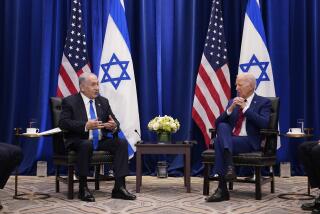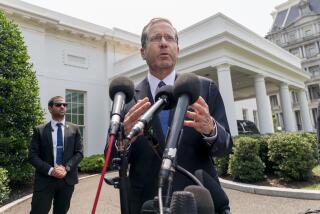New Visa Policy to Lift AIDS Curbs
- Share via
WASHINGTON — Bowing to unrelenting international pressure, the Bush Administration on Friday unveiled a special 10-day visa that does not require foreigners to declare whether they are infected with the AIDS virus.
The new policy is clearly intended to avoid a widespread boycott of June’s international AIDS conference in San Francisco by AIDS activists and researchers upset with previous immigration restrictions.
But while conference organizers were optimistic that the announcement will bolster international participation at the meeting, the policy still left some unsatisfied, and attendance for the meeting remained uncertain.
Until now, a foreigner infected with the AIDS virus had to disclose that fact and then seek a waiver--a procedure that many found offensive.
The new “short-term” visa will be available to visitors scheduled to attend any professional, scientific or academic conference that has been deemed “in the public interest” by Louis W. Sullivan, secretary of the Department of Health and Human Services.
Friday’s announcement, by the Justice Department and the Immigration and Naturalization Service, said Sullivan has “certified” two such conferences: the four-day, sixth annual International Conference on AIDS and the five-day 19th International Congress of the World Federation of Hemophilia, to be held in Washington in August.
“It remains to be seen whether this new policy will relieve the concerns of the countries and health organizations threatening to boycott all international health conferences in the United States,” said Rep. J. Roy Rowland (D-Ga.) and a member of the National Commission on AIDS.
“It represents progress, and all progress is welcomed. But, obviously, it is not a resolution for the problems raised,” added Dr. June Osborne, chairwoman of the commission.
She was referring to the controversy over whether AIDS infection belongs at all on a list of contagious diseases--including leprosy, syphilis and tuberculosis--for which foreigners can be barred from entering the country.
Infection with the human immunodeficiency virus (HIV) was added to that list--which is normally compiled by the U.S. Public Health Service--by Congress in 1987.
Following prolonged and vocal protests from groups that included the International Societies of the Red Cross and the World Health Organization, the federal Centers for Disease Control last February recommended that all but active tuberculosis be expunged from that list.
“Clearly HIV does not belong on that list,” said Osborne, dean of the University of Michigan School of Public Health.
But Bush Administration officials have said that it would take another act of Congress to remove HIV infection from the list.
Last week, Rowland introduced legislation that would grant Sullivan the authority to do so.
Rowland on Friday called the new visa policy “a positive step forward,” but he said that “more needs to be done.”
Sen. Edward M. Kennedy (D-Mass.) agreed, adding: “The Administration needs to continue to work with Congress in order to realign U.S. immigration policy with sound public health principles.”
Among those who remained unappeased by the new visa was Dr. Mervyn Silverman of the American Foundation for AIDS Research.
“I’m terribly disappointed because, on a scale of 10, this is probably a minus 2,” he said. “It misses the point. The issue isn’t the 1990 conference. The conference only focused attention on what is very poor policy.”
Dana Van Gorder, a spokesman for the San Francisco conference, said: “I would think this change will secure the continuing sponsorship of WHO and the International AIDS society.”
But he added: “I don’t think this will impress in the least some of the other boycotting organizations.” Among them are the French and Swiss health ministries.
To date, more than 6,000 scientists, public health officials and AIDS workers from around the world have registered for the meeting, with organizers hoping for as many as 12,000 attendees. Last year, 11,200 persons attended the fifth annual meeting in Montreal.
Staff writer Victor Zonana in San Francisco contributed to this story.
More to Read
Sign up for Essential California
The most important California stories and recommendations in your inbox every morning.
You may occasionally receive promotional content from the Los Angeles Times.













